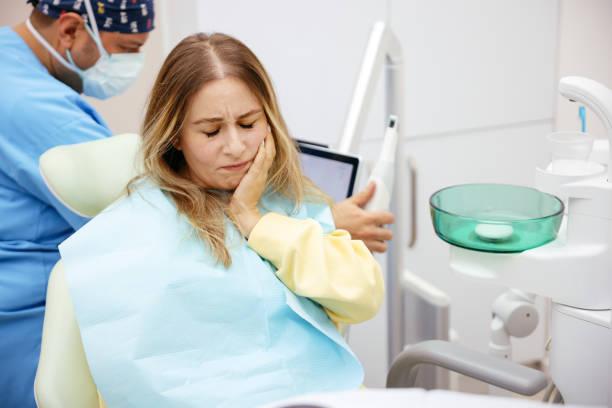When dental emergencies strike, they can be both terrifying and painful. Understanding the common scenarios leading to emergency oral surgery can help you remain calm and make informed decisions.
Read on to learn common situations that require emergency dental care.
Common Dental Emergencies
Many possible scenarios can lead to a dental emergency. Here are some of the most common.
Sudden Tooth Fracture
A sudden tooth fracture can happen for various reasons. These include an accidental blow to the mouth, biting a hard object, or severe decay that weakens the tooth.
Symptoms often include sharp pain, sensitivity to temperature changes, and visible cracks or chips in the tooth. In such situations, it is crucial to seek emergency dental care promptly.
Delaying treatment can cause complications, like infections or more dental work. During your emergency oral surgery, a dentist may use X-rays.
They will assess the damage and recommend treatments. These could range from dental bonding for minor chips to root canals or crowns for more serious fractures.
Knocked-Out Tooth
A knocked-out tooth is another common dental emergency that requires immediate attention. If your tooth gets knocked out entirely, try to retrieve it and keep it moist by placing it in a cup of milk or saliva until you can see a dentist. The chances of re-implanting the tooth drop after 30 minutes. So, it’s essential to act quickly.
In some cases, a knocked-out tooth can be reattached if there is no significant damage to the root or surrounding teeth. Having a tooth trauma kit handy can also be helpful in these situations, so it’s a good idea to keep one at home and in your car.
Severe Toothache
A severe toothache is often a sign of an underlying issue that requires immediate attention. It could be due to a deep cavity, abscessed tooth, or gum disease. If the pain is unbearable and accompanied by swelling or fever, it’s crucial to seek emergency dental care as soon as possible.
Ignoring a toothache can cause complications. It may require invasive treatments like extractions or root canals.
A dentist will assess your toothache during your emergency visit. They will recommend treatment, such as antibiotics for an infection or a filling for a cavity. Chronic pain or sensitivity in the tooth should not be ignored and should be addressed by a dental professional promptly.
Uncontrolled Bleeding
Uncontrolled bleeding in the mouth is a dental emergency. It needs immediate attention.
This could be due to an injury, gum disease, or even a complication from a recent dental procedure. It’s essential to seek emergency dental care to stop the bleeding and prevent any further complications.
An emergency oral surgery may involve cleaning and stitching the area, prescribing antibiotics to prevent infection, or recommending a follow-up procedure if needed. It’s crucial to follow your dentist’s post-treatment instructions. They will help heal and reduce complications.
Injuries to Soft Tissues
Injuries to the soft tissues in your mouth, such as cuts or tears on your lips, cheeks, or tongue, require prompt attention as well. These injuries can occur due to a fall, accidental bite, or even from sharp food items.
Apply gentle pressure with a clean cloth to stop any bleeding and rinse your mouth with warm salt water to clean the affected area. If the injury is severe, seek emergency dental care immediately.
A licensed dentist may prescribe antibiotics or recommend stitches to help heal and prevent complications. An emergency oral surgery may also be necessary if the injury is severe or affects a large area of the mouth.
Dental Abscess
A dental abscess is a painful condition that arises from a bacterial infection at the root of a tooth or in the gum area. Symptoms may include intense pain, swelling, and redness.
A fever may indicate that the infection has spread. If you suspect an abscess, seek emergency dental care. Untreated infections can spread and cause serious complications.
Treatment typically involves draining the abscess and prescribing antibiotics to eliminate the infection. Be sure to have a dental emergency plan in place and contact your dentist immediately if you suspect an abscess.
Broken Dental Appliances
Broken dental appliances, such as braces, retainers, or dentures, can also lead to a dental emergency. These appliances are designed to fit your mouth precisely and should be repaired or replaced as soon as possible if damaged.
For orthodontic emergencies like broken braces or wires, use wax to cover any sharp edges. Then, make an appointment with your orthodontist for repairs.
For other dental appliances, contact your dentist for further instructions. Proper oral hygiene and regular check-ups can help prevent these emergencies from occurring.
Swollen Jaw
A swollen jaw could indicate a range of issues, from an infection to impacted wisdom teeth. If you have severe swelling with pain, trouble opening your mouth, or a fever, seek emergency dental care.
Delaying treatment can worsen infections or complications. They might need more extensive procedures.
A dentist will assess the situation. They may use imaging to find the cause. They may treat infections by draining them or extracting problematic teeth.
Lost Filling or Crown
Losing a dental filling or crown can expose the underlying tooth, leading to increased sensitivity and risk of decay. If you find yourself in this situation, it’s advisable to contact your dentist immediately for guidance.
In the meantime, you can try to keep the area clean and avoid chewing on that side of your mouth. You can use temporary dental cement from pharmacies to cover the exposed area.
This is a stopgap until you get professional care. That may involve re-cementing or replacing the lost filling or crown.
Orthodontic Issues
For those with braces, discomfort from broken brackets or wires is an emergency. Any broken part can cause pain or injury to the surrounding mouth tissues.
If this occurs, it’s important to use orthodontic wax to cover sharp edges and reach out to your orthodontist as soon as possible for a prompt repair. Knowing how to manage minor orthodontic issues can help. It can ease discomfort and prevent complications.
Each of these dental emergencies warrants swift action to ensure optimal oral health and to prevent long-term damage. Knowing these scenarios can help in urgent situations.
Benefits of Oral Surgery
Oral surgery can also provide many benefits for your overall oral health. Here are some of the advantages you can experience from emergency oral surgery.
Correcting Misaligned Teeth
If a tooth is knocked out, fractured, or damaged, emergency oral surgery may be needed. This will remove the tooth and prevent further damage. This can also help align your teeth and improve your bite, reducing the risk of future dental problems.
Fixing misaligned teeth can boost your oral health. It makes it easier to clean your teeth. This reduces the risk of decay and gum disease.
Relieving Pain and Discomfort
Dental emergencies can cause intense pain and discomfort, often interfering with daily activities. Emergency oral surgery can provide relief from this pain by addressing the underlying issues causing it.
Whether it’s a toothache, abscess, or other dental emergency, prompt treatment can alleviate discomfort and promote healing. This can greatly improve your quality of life and allow you to resume normal activities without pain or discomfort.
Preventing Sleep Disturbances
Dental emergencies can also affect your ability to get a good night’s sleep. Pain, discomfort, and swelling in the mouth can make it difficult to fall asleep or stay asleep throughout the night.
Emergency oral surgery can help address these issues and allow you to get a restful night’s sleep, promoting overall health and well-being.
Improving Confidence
Injuries or damage to the teeth can be embarrassing and may impact our self-confidence. Emergency oral surgery can help restore the appearance of damaged teeth, improving your smile and boosting your confidence.
This can have a positive effect on many aspects of your life, from personal relationships to professional opportunities. It will also help maintain good oral health and prevent any further damage or complications.
Restoring Functionality
Restoring functionality is a crucial aspect of emergency oral surgery, especially when dealing with lost teeth, fractures, or damaged dental appliances. When teeth are compromised, they can hinder basic activities such as chewing, speaking, and even maintaining proper oral hygiene.
Emergency oral surgery aims to rectify these issues by re-establishing the necessary function of the mouth. For instance, if a tooth is lost, a dentist may opt for a dental implant or bridge to replace it, allowing patients to eat comfortably and speak clearly once again. Moreover, addressing misalignments or damage can enhance the overall bite, leading to better efficiency in chewing and a more comfortable dental experience.
Enhancing Oral Health Through Emergency Care
Emergency oral surgery not only addresses immediate issues but also plays a vital role in enhancing overall oral health in the long term. By promptly treating dental emergencies, patients can prevent the development of more severe conditions that might result from neglect or delayed treatment.
For example, managing an abscess swiftly helps curb the spread of infection, which could otherwise lead to systemic health issues. This can also save patients from prolonged pain, discomfort, and costly treatments in the future.
Learning When to Have an Emergency Oral Surgery
Emergency oral surgery can occur at any time and often requires prompt attention to prevent further complications. Understanding the different types of dental emergencies and their appropriate treatments is crucial for maintaining good oral health. Remember, swift action can save your tooth and prevent long-term damage. So, always prioritize your oral health and seek immediate care in case of a dental emergency.
Visit our website and read more.




